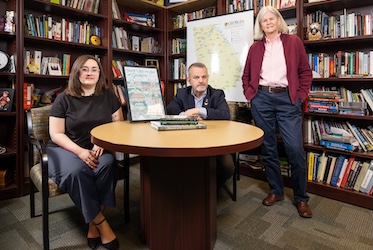
Professor’s research examines how Southern hip-hop highlights Black culture
KENNESAW, Ga. | Feb 18, 2021

To Regina Bradley, Southern hip-hop is more than just about music; it is a means to understanding Black culture, and it offers an opportunity to engage in a dialogue around race.
Bradley, assistant professor of English and African Diaspora Studies, researches how Southern hip-hop influences perspectives on Black history and social issues in the South.
“Being in the South, there is a high regard for the civil rights movement and for those who participated, but I think the challenge is continuing to have those difficult conversations about race, anxiety and place in America, especially in the South,” Bradley said. “Southern hip-hop definitely opens up the door to do that, and does so in a way that engages a more contemporary audience and demographic.”
Bradley’s research posits that Southern hip-hop helps to bridge the gap between the civil rights movement and the present day, allowing people to understand the relevance of past events through contemporary language. To Bradley, the group Outkast was the first hip-hop group to be recognized as being distinctly Southern, and the group’s success was significant because they engage questions that young, Black Southerners deal with – which in turn begins a dialogue.
Bradley’s upcoming book, Chronicling Stankonia: The Rise of the Hip-Hop South, probes the ways music, literature, and film have remixed southern identities for a post–civil rights generation. The title of the book pays tribute to Outkast’s fourth studio album that was released in 2000. The book will be released February 22.
“Stankonia chronicles how Southern hip-hop helps us document the South after the civil rights movement,” said Bradley. “I’m hoping the book opens the door for more engaged and in-depth analysis of Southern rap, and how it helps us think about race, regional identity and the world today.”
To hear more about Bradley’s research, listen to the “Thought Provoking” podcast hosted by KSU’s Norman J. Radow College of Humanities and Social Sciences.
Related Stories

First-year Kennesaw State student, author recognized as versed local historian

Kennesaw State student leverages Double Owl Pathways program to accelerate career path

Kennesaw State student uplifts community through film work, fellowship

Kennesaw State alumni, professor offer guide to Georgia's historic sites in new book
A leader in innovative teaching and learning, Kennesaw State University offers undergraduate, graduate, and doctoral degrees to its more than 47,000 students. Kennesaw State is a member of the University System of Georgia with 11 academic colleges. The university’s vibrant campus culture, diverse population, strong global ties, and entrepreneurial spirit draw students from throughout the country and the world. Kennesaw State is a Carnegie-designated doctoral research institution (R2), placing it among an elite group of only 8 percent of U.S. colleges and universities with an R1 or R2 status. For more information, visit kennesaw.edu.














